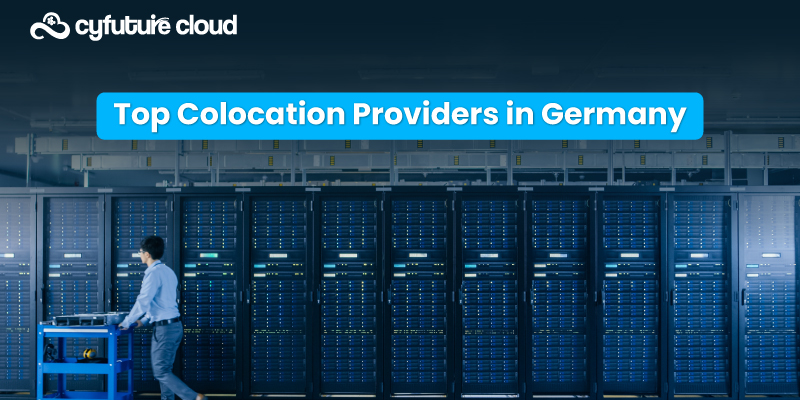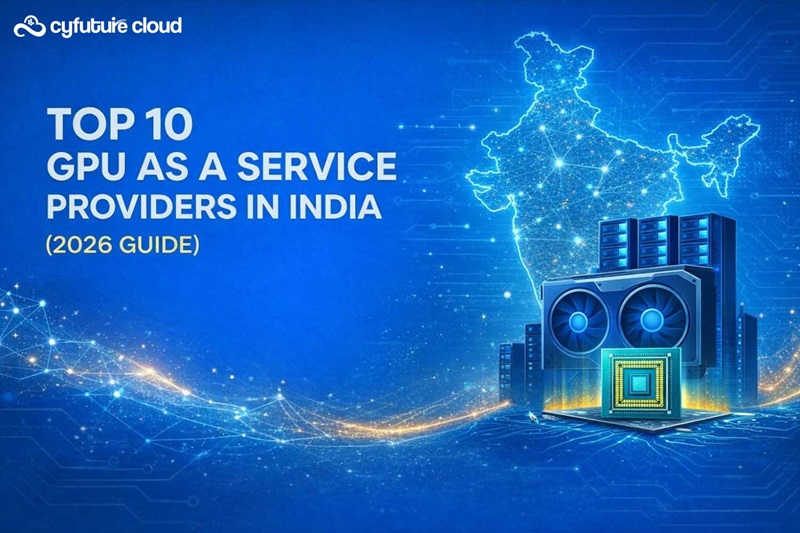Table of Contents
- What Are GPUs and Why Do They Matter?
- Benefits of GPU Cloud Hosting
- 3. Optimized for AI and ML:
- 4. Enhanced Data Handling and Big Data Analytics:
- 5. Versatile Applications Across Industries:
- Why Are GPU Cloud Hosting so Effective for AI and ML Applications?
- Potential challenges and solutions in integration of GPU cloud hosting and AI/ML
- Where Are GPU Cloud Hosting Used Today?
- Why Choose Cyfuture Cloud as Your GPU Cloud Hosting Provider?
Discover the Evolution and Impact of GPUs in AI and ML. From gaming hardware to pivotal components driving massive datasets, complex computations, and the next wave of innovation, learn why GPU cloud hosting have become indispensable for fast parallel processing in applications.
A thorough analysis of the market’s size, share, growth segments by type (CVM, VPC), applications (Machine Learning, Virtual Workstations, High Performance Compute, Internet of Things), and regional forecast with sales value and production consumptions is provided by the GPU Cloud Computing Market [2023–2030] report.
With growing revenue and CAGR status, it offers important insights into development trends, demand breadth, and effective growth tactics used by leading businesses.
In addition, the research assesses the leading firms in the sector by looking at their capacity, pricing, expenditures, revenue, and corporate profile in addition to their product portfolio.

This blog discusses the history of GPUs, their differences from earlier generations, the reasons behind their great effectiveness in AI and ML applications, and the upcoming wave of GPU innovation that will make them even more necessary.
Continue reading…
What Are GPUs and Why Do They Matter?
GPU stands for Graphics Processing Unit. GPUs are often thought about in relation to creating visuals on a computer screen. But GPUs can do so much more, especially for large businesses that require massive amounts of computing power.
Traditionally, computing tasks are handled by the Central Processing Unit (CPU) of a desktop or server. For most applications, that works just fine. However, when cloud, AI, and machine learning applications proliferated, the need for CPUs soon surpassed the capabilities of conventional hardware.
As a result, engineers had to devise a method for offloading a portion of the computational tasks, or else servers would not be able to handle the increasing demand brought on by these new technologies. This is particularly true for AI, which demands enormous processing power.
Benefits of GPU Cloud Hosting
1. High Performance and Parallel Processing:
When it comes to parallel processing, GPUs are exceptional. They can manage several jobs at once and speed up computations considerably when compared to standard CPUs. For computationally demanding workloads like simulations, AI/ML training, and scientific calculations, GPU cloud hosting improves performance.
2. Cost Efficiency and Flexibility:
The pay-per-use approach of cloud-based GPU resources enables customers to pay for resources only when they use them, saving money on upfront infrastructure expenditures. The ability to adjust resources in response to demand, without having to purchase and maintain specialised gear, guarantees cost effectiveness.
3. Optimized for AI and ML:
GPUs speed up the training and inference processes for AI models, enabling more rapid experimentation, iterations, and model correctness. Popular deep learning frameworks like TensorFlow and PyTorch are optimised for cloud-based GPUs, which improves efficiency and speed.
4. Enhanced Data Handling and Big Data Analytics:
GPUs effectively manage large datasets, enabling more rapid data analysis, the creation of insights, and sophisticated calculations in the field of big data analytics. Real-time data processing and analysis are made possible by cloud-based GPUs, which is essential for decision-making and time-sensitive applications.
5. Versatile Applications Across Industries:
GPU cloud hosting addresses a wide range of computing demands and serves a number of industries, including gaming, finance, healthcare, science, and autonomous cars. offers specialised solutions for high-performance computing-intensive industry-specific activities including financial modelling, medical imaging, and 3D rendering.
6. Improved Development and Deployment:
GPU cloud resources speed up new application development and prototype cycles, improving innovation and time-to-market. Quick deployment is made possible by ready access to GPU resources, which guarantees a speedier rollout of services and applications.
7. Scalability and Accessibility:
Because cloud-based GPU resources are globally available, enterprises may install apps closer to customers to cut down on latency. Businesses can effectively handle changing workloads without limitations thanks to on-demand scaling.
The advantages of GPU cloud hosting include enhanced scalability and accessibility, cost-effectiveness, industry-wide adaptability, and AI/ML optimisation. It is an appealing option for businesses needing more rapid and effective computational capabilities because of these benefits.
Why Are GPU Cloud Hosting so Effective for AI and ML Applications?
Because GPUs have special characteristics, GPU cloud hosting is very beneficial for AI (Artificial Intelligence) and ML (Machine Learning) applications.
Parallel Processing Power: GPUs excel at handling parallel tasks. AI and ML algorithms often involve complex computations performed simultaneously. GPUs, with their architecture designed for parallel processing, significantly speed up these operations compared to traditional CPUs.
Massive Data Handling: AI and ML models demand extensive datasets for training. GPUs efficiently manage large volumes of data, executing calculations swiftly. Their high memory bandwidth enables quick access to data, crucial for training algorithms effectively.
Optimized for Matrix Operations: Many AI and ML operations involve matrix multiplication, a fundamental computation. GPUs do these mathematical tasks more quickly than CPUs because they are optimised for them.
Deep Learning Frameworks Optimization: Leading deep learning frameworks like TensorFlow, PyTorch, and CUDA are well optimized for GPU utilization. These frameworks leverage GPU-specific features, maximizing performance during training and inference.
Flexibility and Scalability: Users may access strong GPU resources without having to buy pricey hardware thanks to GPU cloud hosting’s versatility. It also offers scalability, allowing customers to adjust GPU resources in accordance with their computing requirements.
Cost-Efficiency: GPU cloud hosting offers an affordable option for jobs involving AI and ML. By only paying for the resources they use, users may avoid paying for infrastructure up front. With this paradigm, companies may take use of high-performance computing without having to worry about maintaining specialised gear.
Essentially, GPU cloud hosting is a very efficient option for AI and ML applications because to its brilliance in parallel processing, capacity to manage large datasets, optimisation for certain calculations, compatibility with deep learning frameworks, flexibility, scalability, and cost-effectiveness.
Potential challenges and solutions in integration of GPU cloud hosting and AI/ML
|
Challenges in Integration |
Solutions |
|
1. Cost Management GPU resources in the cloud can be expensive for continuous AI/ML tasks. |
-Cost Optimization: Implement resource-aware scheduling, spot instances, or reserved instances for cost-effective access. – Efficient Use: Use on-demand provisioning to scale resources based on workload demands. |
|
2. Resource Allocation Limited availability and potential bottlenecks in accessing GPU resources in cloud environments. |
– Dynamic Allocation: Utilize auto-scaling and load balancing techniques to manage GPU resources efficiently based on workload requirements. – Hybrid Setup: Consider a hybrid approach to balance workloads between on-premises and cloud-based GPUs. |
|
3. Complexity in Optimization Optimizing AI/ML workloads for GPU usage requires specific expertise and may pose a challenge for developers. |
– Tools and Support: Utilize GPU-optimized libraries and tools provided by cloud service providers. – Expertise Development: Encourage skill development within teams through training or seek external expertise for optimization. |
|
4. Data Transfer and Latency Moving large datasets to and from the cloud can be time-consuming and lead to latency issues. |
– Edge Computing: Implement edge computing strategies to preprocess data or perform inference closer to the source, reducing data transfer to the cloud. – Data Management: Use data compression techniques and efficient data management strategies to minimize transfer times and optimize storage in the cloud. |
|
5. Scalability Concerns Scaling GPU resources for varying workloads and demands might pose challenges. |
– Elastic Scaling: Implement elasticity in GPU provisioning to dynamically adjust resources as per workload fluctuations. – Containerization: Utilize containerization technologies to facilitate easier scaling and management of GPU-based applications. |
|
6. Compatibility and Integration Issues Ensuring seamless integration of GPU-accelerated frameworks with existing AI/ML workflows. |
– Framework Optimization: Ensure compatibility and optimization of popular AI/ML frameworks (like TensorFlow or PyTorch) for GPU usage. – API and Interface Standards: Employ standardized APIs and interfaces to streamline integration with GPU-accelerated hardware. |
|
7. Security Concerns Ensuring data security and privacy when utilizing shared GPU resources in a cloud environment. |
– Secure Protocols: Implement encryption and secure communication protocols for data transmitted to and from GPU instances. – Isolation Measures: Utilize robust isolation techniques to ensure data security within multi-tenant GPU environments. |
|
8. Resource Monitoring and Management Tracking and managing GPU resource utilization for optimal performance and cost-effectiveness. |
– Resource Monitoring Tools: Deploy monitoring tools to track GPU usage, enabling efficient resource management. – Performance Optimization: Analyze usage patterns and optimize GPU instances for better performance and cost efficiency. |
Where Are GPU Cloud Hosting Used Today?
GPU cloud hosting finds application across various industries and use cases where high-performance computing and parallel processing are essential. Some prevalent areas where GPU cloud hosting is used include:
1. AI and Machine Learning (ML):
GPU cloud hosting accelerates model training for AI and ML tasks, enhancing the speed and efficiency of training complex algorithms.GPUs enable rapid inference processing, allowing AI applications to make real-time predictions and decisions.
2. Scientific Research and Simulation:
GPU-accelerated computing aids scientific simulations, weather forecasting, molecular modeling, and other complex computations. Processing vast datasets in fields like genomics, astrophysics, and climate modeling is facilitated by GPU cloud hosting.
3. Gaming and Entertainment:
GPUs in the cloud assist game developers in rendering high-quality graphics and improving gaming performance. Cloud-based GPU resources power streaming platforms for video rendering, transcoding, and graphics-intensive applications.
4. Finance and Fintech:
GPU cloud hosting accelerates financial modeling and risk analysis, handling large-scale data computations efficiently. High-frequency trading algorithms benefit from GPU-powered computations for faster decision-making.
5. Healthcare and Life Sciences:
GPU cloud hosting supports medical image processing, aiding in diagnostic imaging, MRI, CT scans, and pathology analysis. Accelerates drug discovery processes by facilitating molecular modeling and simulations.
6. Autonomous Vehicles and Robotics:
GPU-based cloud resources power real-time object detection and recognition systems in autonomous vehicles and robotics. GPU cloud resources enhance processing capabilities for navigation and control algorithms in autonomous systems.
7. Rendering and 3D Modeling:
Cloud-based GPUs assist in rendering complex visual effects for movies, animations, and architectural designs. Accelerates 3D modeling processes for architects, designers, and engineers.
GPU cloud hosting continues to expand its influence across industries, enabling faster computations, enhanced performance, and scalability for a wide array of applications that require intensive computational power and parallel processing.
Why Choose Cyfuture Cloud as Your GPU Cloud Hosting Provider?
Cyfuture Cloud is a renowned public cloud service provider to small businesses, SMBs, accountants, CPAs, and IT enterprises.
We provide scalable cloud solutions built on commercial and open-source technologies like KVM, OpenStack, and CEPH. We also provide the latest NVIDIA A series GPUs with resizable GPU instances, which are specially customized for AI & ML workloads.
Cyfuture Cloud public cloud services are extremely secure with guaranteed protection against DDoS attacks and provide 24-hour customer service support to take care of all your cloud-related problems. By using OpenStack, Ace eliminates vendor lock-ins.
Cyfuture Cloud Public Cloud is hosted in tier 4 and tier 5 data centers to ensure high availability, data security, and redundant storage. We offer simple subscription plans and different compute instances with multiple price options no matter how big or small your requirements are.
Contact us to leverage GPU Cloud hosting for your next industry project.
Recent Post
Send this to a friend

 Server
Colocation
Server
Colocation CDN
Network
CDN
Network Linux
Cloud Hosting
Linux
Cloud Hosting Kubernetes
Kubernetes Pricing
Calculator
Pricing
Calculator
 Power
Power
 Utilities
Utilities VMware
Private Cloud
VMware
Private Cloud VMware
on AWS
VMware
on AWS VMware
on Azure
VMware
on Azure Service
Level Agreement
Service
Level Agreement 




















